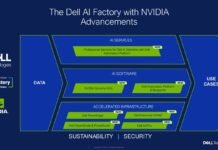Unlocking AI Potential: Dell and NVIDIA Revolutionize the AI Landscape
Introduction
In an era where artificial intelligence (AI) is transforming business operations, Dell Technologies and NVIDIA have unveiled a groundbreaking update to their joint AI platform at SC25. This innovation aims to streamline the deployment of AI workloads, catering to a broad spectrum of applications—from legacy models to cutting-edge agent-style systems. As organizations increasingly embrace AI, they face common challenges, including managing diverse hardware and software, safeguarding data, and ensuring scalable systems. This article delves into how the Dell AI Factory, in collaboration with NVIDIA, addresses these challenges, offers enhanced infrastructure, and accelerates the journey from AI pilot projects to full-scale deployment.
The Need for Robust AI Solutions
As companies ramp up their AI initiatives, many encounter similar obstacles. A recent study highlights that organizations prefer partnering with trusted technology providers to navigate these complexities. This partnership is especially valuable when AI solutions can operate closer to their proprietary data, enhancing security and efficiency.
The Dell AI Factory: Bridging Ideas and Results
The Dell AI Factory, powered by NVIDIA, embodies this philosophy by integrating Dell’s comprehensive infrastructure stack with NVIDIA’s advanced AI tools. Supported by Dell’s professional services team, the platform is designed to help organizations translate AI concepts into tangible outcomes while minimizing technical complexities.
Accelerating Deployment Through Integrated Platforms
Enhanced Storage and Performance
Dell is bolstering its storage and AI capabilities to facilitate automated setups, boost performance, and ensure real-time AI operations. The integration of ObjectScale and PowerScale—Dell’s storage engines—now works seamlessly with NVIDIA’s NIXL library from NVIDIA Dynamo. This collaboration supports scalable Key-Value (KV) Cache storage, achieving a remarkable one-second Time to First Token with a 131K-token context window, all while significantly reducing costs and easing GPU memory requirements.
Cutting-Edge Hardware Support
The Dell AI Factory also enhances compatibility with the Dell PowerEdge XE7740 and XE7745 systems, now equipped with NVIDIA RTX PRO 6000 Blackwell Server Edition GPUs and NVIDIA Hopper GPUs. Dell claims these systems provide organizations with the capacity to handle larger multimodal models, agent-style workloads, and complex training tasks, all while delivering robust performance.
Streamlining AI Workflows with Automation
To eliminate guesswork, Dell’s Automation Platform offers tuned and validated deployments through secure setups. This platform aims to generate repeatable results and guide teams in building effective AI workflows. Additionally, software tools like the AI code assistant from Tabnine and the agentic AI platform from Cohere North enhance automation, enabling teams to expedite workload transitions into production while maintaining manageable operations.
Next-Generation Infrastructure for Enhanced AI Performance
Upgraded Infrastructure Portfolio
The Dell PowerEdge XE8712, launching next month, is set to revolutionize infrastructure support for more complex AI and High-Performance Computing (HPC) workloads. This system can accommodate up to 144 NVIDIA Blackwell GPUs within a standard rack, making rack-scale AI and HPC more accessible than ever. Unified monitoring and automation capabilities—enabled through iDRAC, OpenManage Enterprise, and the Integrated Rack Controller—enhance management ease and operational efficiency.
Embracing Open Standards
The Enterprise SONiC Distribution by Dell Technologies now supports NVIDIA Spectrum-X platforms alongside NVIDIA’s Cumulus OS. This advancement allows organizations to construct open, standards-based AI networks that function across multiple vendors. The latest SmartFabric Manager release extends compatibility with Dell’s Enterprise SONiC on NVIDIA Spectrum-X platforms, aiming to minimize deployment time and setup errors through guided automation.
Expanding AI Ecosystem for Greater Flexibility
Diverse AI Tools and Solutions
Organizations are continuously reassessing their AI budgets and strategies, prompting a desire for flexibility in their toolsets. Red Hat OpenShift for the Dell AI Factory with NVIDIA is now validated on additional Dell PowerEdge systems, providing teams with various options for scaling AI workloads.
Enhanced Support for AI Workloads
Support now encompasses both the Dell PowerEdge R760xa and the Dell PowerEdge XE9680, equipped with NVIDIA H100 and H200 Tensor Core GPUs. This integration combines Red Hat’s robust controls with Dell’s secure infrastructure, paving a clearer path for businesses keen on scaling AI.
Conclusion
The updates from Dell and NVIDIA are designed to facilitate a seamless transition for organizations moving from small-scale AI pilots to full production deployments. As Jeff Clarke, Vice Chairman and Chief Operating Officer at Dell Technologies, aptly stated, the Dell AI Factory with NVIDIA addresses a fundamental challenge for many teams: transitioning from AI experimentation to production without the need for extensive infrastructure overhaul. Both Dell and NVIDIA are committed to supporting businesses in deploying AI at scale, thereby realizing measurable impacts that redefine operational dynamics.
FAQs
1. What is the Dell AI Factory?
The Dell AI Factory is a collaborative platform between Dell Technologies and NVIDIA that integrates infrastructure, AI tools, and professional services to help organizations efficiently deploy AI workloads.
2. How does Dell’s Automation Platform simplify AI deployment?
Dell’s Automation Platform delivers tuned and validated deployments through secure setups, aiming for repeatable results and clearer paths for building AI workflows.
3. What are the benefits of using NVIDIA GPUs with Dell PowerEdge systems?
The integration of NVIDIA GPUs, like the RTX PRO 6000 and Hopper GPUs, enhances performance for larger multimodal models and complex workloads, providing organizations with robust capabilities.
4. Why is open standards support important for AI networks?
Open standards support enables organizations to build AI networks that can operate across various vendors, reducing vendor lock-in and fostering innovation.
5. How do Dell and NVIDIA’s updates impact the AI landscape?
These updates aim to facilitate the transition from AI pilots to production, providing organizations with the tools needed to scale their AI initiatives effectively and confidently.







